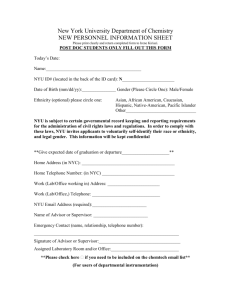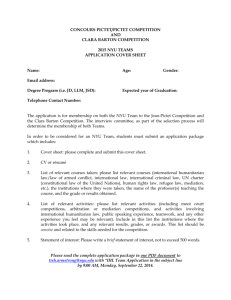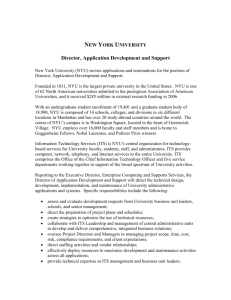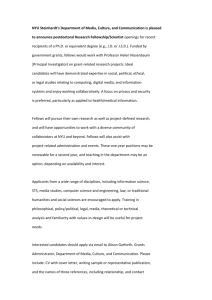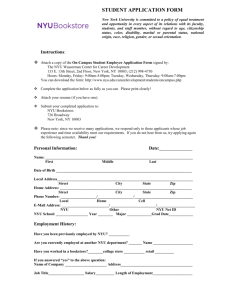Life and Death CORE-UA 400, Section 020 J. David Velleman
advertisement
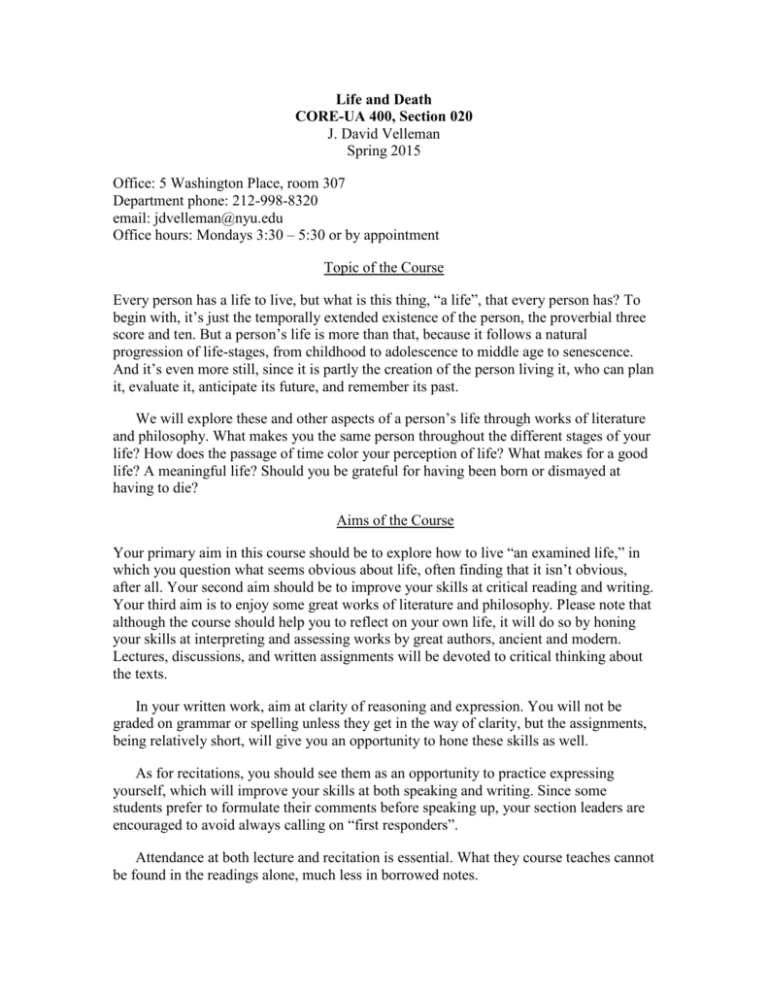
Life and Death CORE-UA 400, Section 020 J. David Velleman Spring 2015 Office: 5 Washington Place, room 307 Department phone: 212-998-8320 email: jdvelleman@nyu.edu Office hours: Mondays 3:30 – 5:30 or by appointment Topic of the Course Every person has a life to live, but what is this thing, “a life”, that every person has? To begin with, it’s just the temporally extended existence of the person, the proverbial three score and ten. But a person’s life is more than that, because it follows a natural progression of life-stages, from childhood to adolescence to middle age to senescence. And it’s even more still, since it is partly the creation of the person living it, who can plan it, evaluate it, anticipate its future, and remember its past. We will explore these and other aspects of a person’s life through works of literature and philosophy. What makes you the same person throughout the different stages of your life? How does the passage of time color your perception of life? What makes for a good life? A meaningful life? Should you be grateful for having been born or dismayed at having to die? Aims of the Course Your primary aim in this course should be to explore how to live “an examined life,” in which you question what seems obvious about life, often finding that it isn’t obvious, after all. Your second aim should be to improve your skills at critical reading and writing. Your third aim is to enjoy some great works of literature and philosophy. Please note that although the course should help you to reflect on your own life, it will do so by honing your skills at interpreting and assessing works by great authors, ancient and modern. Lectures, discussions, and written assignments will be devoted to critical thinking about the texts. In your written work, aim at clarity of reasoning and expression. You will not be graded on grammar or spelling unless they get in the way of clarity, but the assignments, being relatively short, will give you an opportunity to hone these skills as well. As for recitations, you should see them as an opportunity to practice expressing yourself, which will improve your skills at both speaking and writing. Since some students prefer to formulate their comments before speaking up, your section leaders are encouraged to avoid always calling on “first responders”. Attendance at both lecture and recitation is essential. What they course teaches cannot be found in the readings alone, much less in borrowed notes. Policies In some lectures or parts of lectures, you will need to take notes; in others, note-taking will only get in the way of understanding and questioning. I will try to alert you to which is which. Laptops will not be permitted in class. Research has shown that students who take notes by hand learn more and understand it better than those who type. In any case, there will be diagrams to draw (yes, really). You will be required submit your papers via NYU Classes in MS Word or RTF format. Your papers, without your name but with the instructor’s comments and the grade, will be posted on Classes for everyone to read. Your taking the course counts as consent to have your work posted in this way. You will be encouraged to read other students’ papers — especially the ones that will be flagged as worth reading. Because all of the papers will be posted, you will not have no opportunity to revise written work. Instead, the early assignments will count less toward your grade, so that you will feel free to take risks on them, knowing that you will have a chance to improve along the way. Grading First paper: 10% Second paper: 15% Third paper: 20% Fourth paper: 25% Final exam: 30% Attendance at lectures and recitation is required. More than three unexcused absences will lower your grade. Please note the date and time of the final exam now and plan accordingly. Readings 1/26 - 1/28: Childhood: Charles Dickens, Great Expectations, Chapters 1 - 9 (NYU Classes) 2/4 - 2/18: Personal identity Franz Kafka, The Metamorphosis (bookstore) First paper: 500 words 2/23 - 3/4: The passage of time: Kurt Vonnegut, Slaughterhouse-Five (bookstore) Second paper: 1000 words 3/9 - 3/11: Adolescence Carson McCullers, The Member of the Wedding (bookstore) 3/16 - 3/21: Spring Break 3/23 - 4/8: A good life Cicero, De Finibus, Book 1, sections 9–21 (NYU Classes) Aristotle, Nicomachean Ethics, Books 1 & 2, Book 10, §§ 1–5 (NYU Classes) Third paper: 1500 words 4/13 - 415: Mid Life Leo Tolstoy, “A Confession” (bookstore) 4/20 - 4/29: Old age and death Leo Tolstoy, “The Death of Ivan Ilych” (bookstore) Epicurus “Letter to Menoeceus” 5/4 - 5/13: Birth Imre Kertesz, Kaddish for an Unborn Child (Bookstore) Final paper: 2000 words 5/18: Final exam, 10:00 - 11:50 am Where to find the texts The following texts will be available in paperback at the NYU bookstore. You may use Kindle or Nook editions provided that they have the same ISBN number. (You may not need a Kindle or Nook in order to use the e-book editions. Check whether the necessary app is available for your laptop or tablet.) Texts not listed here will be available in pdf on NYU Classes (accessible through the “Academics” tab on NYU Home). Franz Kafka. The Metamorphosis: A New Translation by Susan Bernofsky. W. W. Norton & Company (2014). ISBN: 0393347095 Kurt Vonnegut, Slaughterhouse-Five. Dial Press Trade Paperback; Reissue edition (2009) ISBN: 0385333846 Carson McCullers, The Member of the Wedding. Mariner Books; Reprint edition (2004). ISBN: 0618492399 Leo Tolstoy, The Death of Ivan Ilych and Confession. Liveright (2014). ISBN: 0871402998 Imre Kertesz, Kaddish for an Unborn Child. Vintage (2007). ISBN: 1400078628
